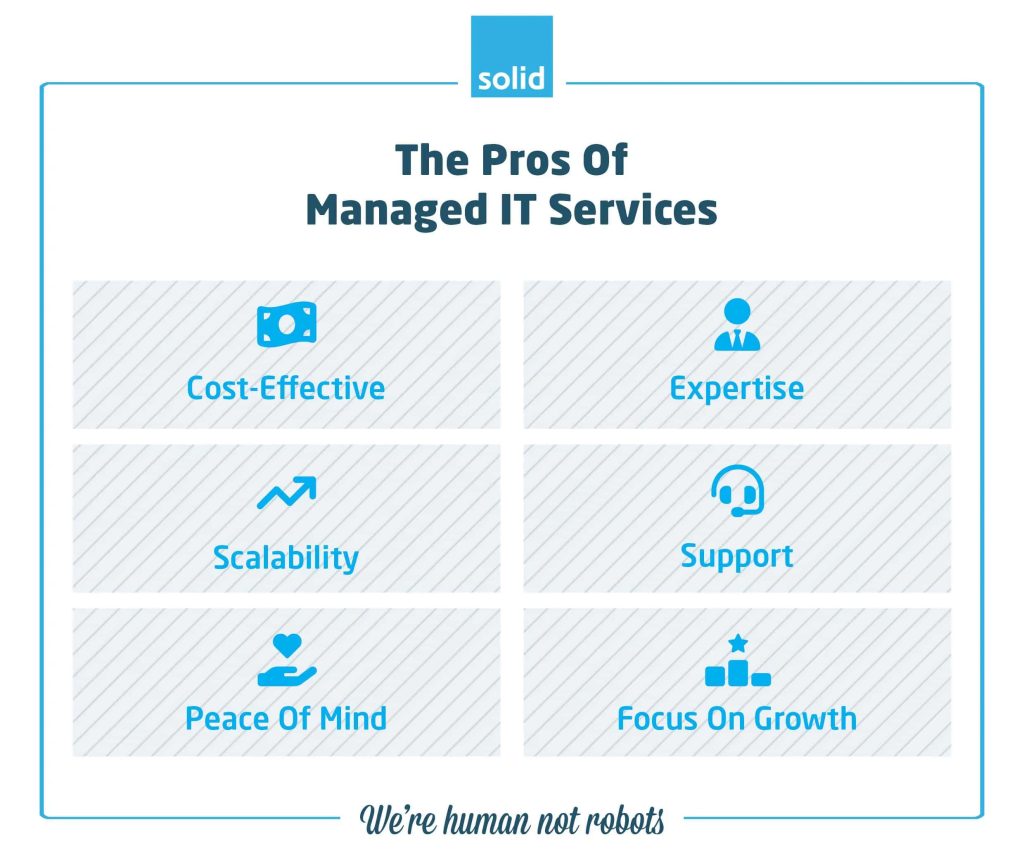
Technology has woven itself into the very fabric of our everyday lives, becoming an indispensable player in the modern business landscape. The deployment of advanced technology and digital strategies has made it possible to streamline operations, enhance productivity, and deliver exceptional customer experiences. Ground-breaking solutions such as cloud services, data analytics, and AI have transformed the decision-making process, providing valuable insights and enabling businesses to stay ahead of the curve. But technology needs to be intricately balanced to offer maximum benefit to your business.
When it comes to managing your business’s technological needs, there are two main approaches – managed IT services vs in-house IT. Both have their own set of advantages and disadvantages, making it crucial for you to carefully evaluate your options before making a decision on which approach to take.
In this article, we will dive into the differences between these two approaches and help you determine which one is best suited for your business’s unique needs.
What Are Managed IT Services?
Taking advantage of managed services IT means outsourcing all or part of your company’s IT operations, maintenance and management to an IT managed service provider. This can include tasks like network monitoring, security management, data backup and recovery, software updates, and IT support. Your IT partner takes on the responsibility of managing and maintaining your business’ IT infrastructure, freeing up valuable time and resources for you and your teams to focus on your core offering.
What Is In-House IT?
When looking at managed IT services vs in-house IT, the latter option means hiring an internal team dedicated to handling all of your company’s technology needs. This team is responsible for configuring, managing, and maintaining your IT infrastructure. They are also in charge of providing technical support to the humans across your business and implementing new technologies as needed.
The Pros Of In-House IT
When considering the question of whether to use managed IT services vs in-house IT, it’s important to understand that there are pros and cons to either scenario. Let’s take a look at a few of the advantages that having an in-house team of IT pros can provide:
• Control
Having an in-house IT team means having complete control over your technology and systems. Your internal team can set up processes and procedures that align with your company’s goals and culture, giving you more flexibility and autonomy in managing your IT solutions.
• Familiarity
An in-house IT team also has a deep understanding of your business and its unique needs. This means they can respond to issues effectively and efficiently, as well as provide tailored solutions that cater specifically to your company’s goals. They are also familiar with your systems and processes, which leads to quicker problem resolution.
• Integration
Having an in-house IT team also allows for better integration with other departments and systems within your company. This can lead to smoother collaboration and enhanced communication, as well as more efficient processes overall.
The Cons Of In-House IT
While in-house IT support may seem appealing, there are also quite a lot of downsides to consider:
• Cost
Hiring and maintaining an in-house IT team can be costly. You need to provide salaries, benefits, and training for your IT staff, as well as invest in hardware and software regularly. Then there’s the fact that hiring professionals with the skills and experience that you need often comes at a higher cost than your average employee.
• Limited Expertise
Despite having a dedicated team, in-house IT may not have the same level of expertise and experience as a managed IT provider. They may not have access to the latest technology or resources that can improve your systems and processes, and it’s often difficult for even the most knowledgeable IT professional to find the time to stay up to date with the latest trends and best practices, meaning that their knowledge and experience wanes over time. This can lead to limited knowledge and solutions, which can hinder your business growth.
• Staff Turnover
In-house IT teams are not immune to staff turnover, which can disrupt your business operations and continuity. Losing key IT personnel means having to train new employees and losing valuable knowledge about your systems and processes, and potentially losing visibility to them as well if you don’t have comprehensive documentation. This can lead to delays and inefficiencies in solving IT issues.
• Time Management
Having an in-house IT team also means that your employees may have to split their time between their regular roles and IT responsibilities. This can lead to a decrease in productivity and a lack of focus on core business tasks, which can impact the overall growth of your company.
• Inefficiency
When your in-house IT team come across advanced and complex problems or need to implement new technology that they aren’t familiar with, it is likely to take them a lot more time than your average troubleshooting. This makes time management issues even more prevalent, seeing them become less of a ‘con’ and more of a critical failure that can result in delays and potential downtime for your business, harming your reputation and bottom line.
The Pros Of Managed IT Services

Now that we’ve taken a look at the pros and cons of the in-house side of the managed IT services vs in-house IT debate, it’s time to take a look at a few of the advantages that managed IT solutions can offer your business:
• Cost-Effective
Managed IT is often viewed as the more expensive choice for businesses. This is a common misunderstanding. In reality, outsourcing your technology needs to a managed IT services provider can actually be the more cost-effective options. Hiring, training, and maintaining an in-house team, which can be quite costly once you factor in salaries, benefits, and ongoing training. When you work with a technology partner, you pay a fixed monthly fee for maintenance and support, reducing the costs of acquiring and maintaining talent within your business.
Even if you do already have an IT team within your business, outsourcing your technology management can still be less costly, because you don’t need to directly invest in expensive hardware, software and other resources, and can take advantage of discounts for the technology that you do need to buy. This translates into significant cost savings over time.
• Expertise
Finding individuals with the right skills and experience to manage your IT systems in-house is no laughing matter. They are few and far between, and when you do find them, they often come at a high salary point. Managed IT services providers like Solid Systems, on the other hand, are experts in technology. We have a wealth of experience, knowledge and expertise that we can bring to your business. By partnering with the right technology partner, you gain access to top-level IT professionals who can provide valuable insights and guidance on the latest industry trends and advancements. With an external partner handling your technology needs, you can rest assured that your systems will be kept up-to-date with the latest tools and methods, keeping you ahead of the competition.
• Scalability
The scalability of managed IT services is another significant advantage. As your business grows, so do the demands on your technology systems. With an in-house team, you would need to invest in more equipment and resources as your business expands, which can be costly and time-consuming. However, with a managed IT services provider like Solid Systems, scaling up or down is quick and seamless. We have the flexibility and resources to accommodate your changing needs without any disruptions to your daily operations. From adding new users to upgrading hardware, we can handle it all with ease.
• Support
When it comes to technology issues and challenges, having reliable support is crucial. With in-house IT, you are limited to the expertise of your team members, which may or may not be enough to handle complex problems. Even when they do have the know-how to provide the support that your humans need, every issue that your teams experience and every minute that they spend on support is taking them away from their core role. And what if someone on your IT team is out sick or on vacation? There is often no one else who can step in to provide support. With a managed IT services provider like Solid Systems, you have a dedicated team of experts available 24/7 to resolve any issues that may arise. You can rest easy knowing that your systems are constantly monitored and supported by skilled professionals who are always just a phone call away.
• Peace Of Mind
The peace of mind that comes with knowing your technology needs are taken care of by experts cannot be overstated. With in-house IT, there is always a level of risk involved as your team may not have the expertise or resources to handle all potential risks and threats. This can leave your business vulnerable to cyberattacks, system failures, and other issues that could result in significant downtime and loss of productivity. On the other hand, managed IT services providers like Solid Systems have dedicated security measures and protocols in place to ensure the safety and protection of your systems and data. We stay updated on the latest industry trends and best practices to keep your business secure against any potential threats, and take a proactive approach to managing your technology, helping you to detect any issues before they can impact your operations.
• Focus On Growth
By partnering with a reliable managed IT services provider like Solid Systems, we can take the burden of managing your technology off your shoulders. This allows you and your team to focus on what really matters – growing your business. While an in-house team may get bogged down with day-to-day maintenance tasks and troubleshooting, taking valuable time away from strategic planning and other important business activities, by outsourcing these tasks to a managed IT services provider, you free up more time for innovation and growth, giving you a competitive edge in the market. With Solid Systems as your technology partner, you can rest assured that your IT needs are taken care of, allowing you to focus on strengthening and expanding your business.
The Cons of Managed IT Services
While managed IT services offer a range of benefits, there are also some potential downsides to consider, especially if you choose the wrong managed IT service partner. These can include:
• Dependence On Third Party Providers
Outsourcing your technology needs means that you are dependent on the expertise and availability of your managed IT services provider. This can be a concern for some businesses who may feel they have less control over their own systems. However, with a reliable and experienced provider like Solid Systems, you can trust that we will always be available to support your business and provide the necessary expertise.
• Limited Control
Outsourcing your IT also means giving up some level of control over your systems. Your managed IT services provider may have their own processes and procedures in place, which may not align with your internal practices. This can create some challenges in terms of managing and coordinating technology solutions within your business. This is why it’s important to find the right technology partner who has a good understanding of your unique needs and goals, and aligns with your company culture.
• Communication And Collaboration Challenges
Outsourcing your IT also means relying on a third party for communication and collaboration. This can sometimes lead to miscommunication or delays in responding to urgent issues. However, when you find the right managed IT service provider, they will prioritise clear, transparent, and effective communication to ensure that your business needs are always met in no time.
Which Route Is Right For Your Business - Managed IT Services vs In-House IT?
When looking at the pros of the in-house IT argument, it’s important to bear in mind that a lot of the benefits gained from managing your technology internally can also be bolstered by finding the right IT services partner.
When you work with a technology partner like Solid Systems, we work with you to gain a deep understanding of your businesses – your unique needs and goals – and to enhance your IT without ever limiting your control. And when it comes to integration and communication, our goal as a business is to enhance human connection to make a difference in people’s lives.
What this means, in essence, is that when you work with Solid Systems, you are getting all of the advantages of both in-house and managed IT services, while minimising the cons to your business operations.
With over 20 years in the IT industry, and with a team of skilled and experienced IT Pros behind us, we are perfectly placed to not just maintain your IT systems, but to further them through strategic technology planning, secure them with the help of world-class tools and experts, and see your business thriving.
If you’re a company with 20 or more users, and are looking for a technology partner who is going to work with you to both manage and further your IT to see you exceeding your goals, then you’ve come to the right place. Schedule a free consult with our Sales team today, and let’s learn more about your unique business needs.
Frequently Asked Questions
Managed IT means outsourcing your technology management to a specialised third-party provider, offering access to a wide pool of expertise, potentially lower costs, and more advanced tools. In contrast, in-house IT involves managing your technology needs internally within your business, providing direct control and deeper knowledge of your specific systems, but potentially at a higher cost and with a narrower range of expertise.
What does in-house mean in technology?
In technology, ‘in-house’ refers to operations, solutions or services that are managed internally within a company. This means that you use your own employees and resources to tackle technological needs, offering a higher level of control and deep integration with existing systems. This approach often requires significant investment in staffing, training, and infrastructure.
Popular Searches
- IT Trends
- Advanced Threat Protection
- What is Cloud Security
- IT Consultant
- Business Cyber Hygiene
- Benefits of Network Monitoring
- Advantages of Cloud Infrastructure
- IT Risk Management
- Azure Backup and Recovery
- 9 Types of Cyber Attacks
- Managed IT Service for Accountant
- Advantages of Outsourcing IT Services





